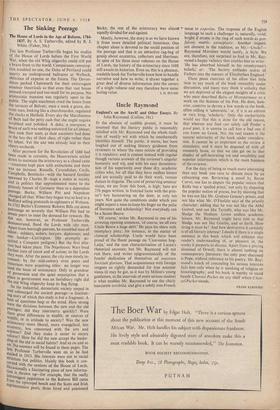Uncle Raymond
IN the absence of audible protest, it must be assumed that the literary public is reasonably satisfied with Mr. Raymond and the whole tradi- tion of weekly wit with which he unashamedly identifies himself. The public, it seems, has been laughed out of seeking literary guidance from reviewers to whom the mere notion of providing it is repulsive; and is content instead with regular though various avowals of the reviewer's singular humanity and wit, and with his easy demonstra- tion of his superiority over those dry, academic critics who, for all that they have endless leisure and are actually paid to do their work, remain dunces in disguise. The cost of preserving amateur status, we see from this book, is high; here are 256 pages written, in frenzied haste with the prin- ter's boy hammering on the door, in only ten years. Not quite the conditions under which you might expect a man to keep his finger on the pulse of literature and scholarship! Not everybody can be a Sainte-Beuve.
'Of course,' writes Mr. Raymond in one of his arresting opening sentences, 'of course, we all owe Uncle Beuve a huge debt.' He pays his share with exemplary piety; for instance, in the matter of classical scholarship. Uncle would have been proud of the fluent passage on 'Ciceronian bog- Latin,' and the neat characterisation of Lucan's rhetorical excesses; but Mr. Raymond will not rest there, and writes epigrammatically of the Jesuits' dedication of themselves ad majoram Societati gloriam. That acquaintance with foreign tongues so rightly demanded for true amateur status (it may be got, as it was by Milton's young gentlemen, in the intervals of more serious studies) is what enables Mr. Raymond to use the chicly inaccurate terribilta, and give a subtly non-French sense to expertise. The response of the English language to such a challenger is, naturally, vivid; bright if erratic is the ring of such words as gon- falcon, matric, esenoplastic. Another import-
ant element in the tradition, as Mr.—Uncle?- Raymond Mortimer would testify, is Style. We are, therefore, not surprised to find in Mr. Ray- mond a happy valiancy that enables him to write : 'He has absorbed himself in his countryman's beliefs,: or : 'The Society enfilades scores of Fathers into the manors of Elizabethan England.'
These pious exercises of his allow him little time to say much of the book ostensibly under
discussion, and many may think it unlucky that we are deprived of the elegant insights of a critic who once described Bubu of Montparnasse as a work on the Stations of the Pox. He does, how- ever, contrive to devote a few words to the book, often calling it 'admirable,' or, if it is an edition or very long, 'scholarly.' Only the uncharitable would say that this is done for the old reason, that whereas any fool can safely call Pindar a good poet, it is unwise to call him a bad one if you know no Greek. No; the real reason is the natural inferiority of the book under considera- tion. It cannot be as important as the review it stimulates; and it must be disposed of with all mannerly haste, so that we can get on to that display of self-lacerating wit and sensibility and superior information which is the main business of the reviewer.
For the duty of being so much more interesting than any book you care to discuss must be an exhausting one. Reviewing a novel by Baron Corvo, one has to dispute the popular notion that Rolfe was a 'spoiled priest,' not only by disputing the popular notion of priests, but by showing that he was not like Mr. Graham Greene's priests, and not like what Mr. O'Faolain says of the priestly character; adding that he was net like the Abb6 Guitrel, and not like Tartuffe, who was like Mr. Sludge the . Medium. Given endless academic leisure, Mr. Raymond might have told us that Sludge was not like Goethe, and so forth. How tiring it must be ! And how destructive it certainly is of all literary interest! I doubt if there is a single sentence in this book which will enhance any reader's understanding of, or pleasure in, the works it purports to discuss. Apart from a pitying dismissal of Orwell, there is almost nothing on contemporary literature; the only poet discussed is Pope, without reference to his poetry. Mr. Ray- mond's knack of concealing his serious interests fails him only when he is speaking of religion or historiography; and his book is worthy to stand beside Channel Packet on any shelf where Chan- nel Packet stands.
FRANK KERMODE










































 Previous page
Previous page